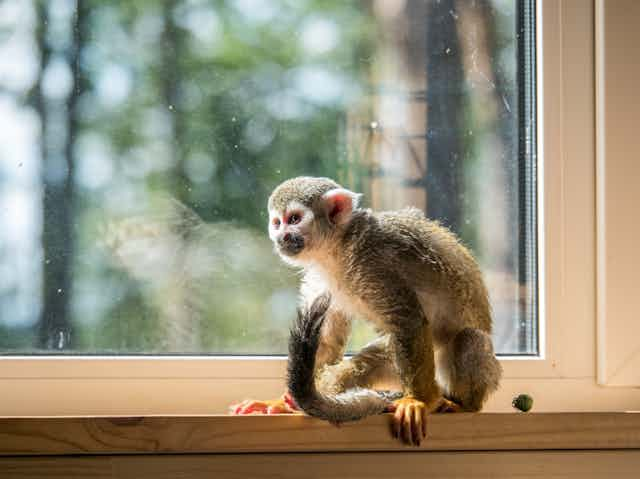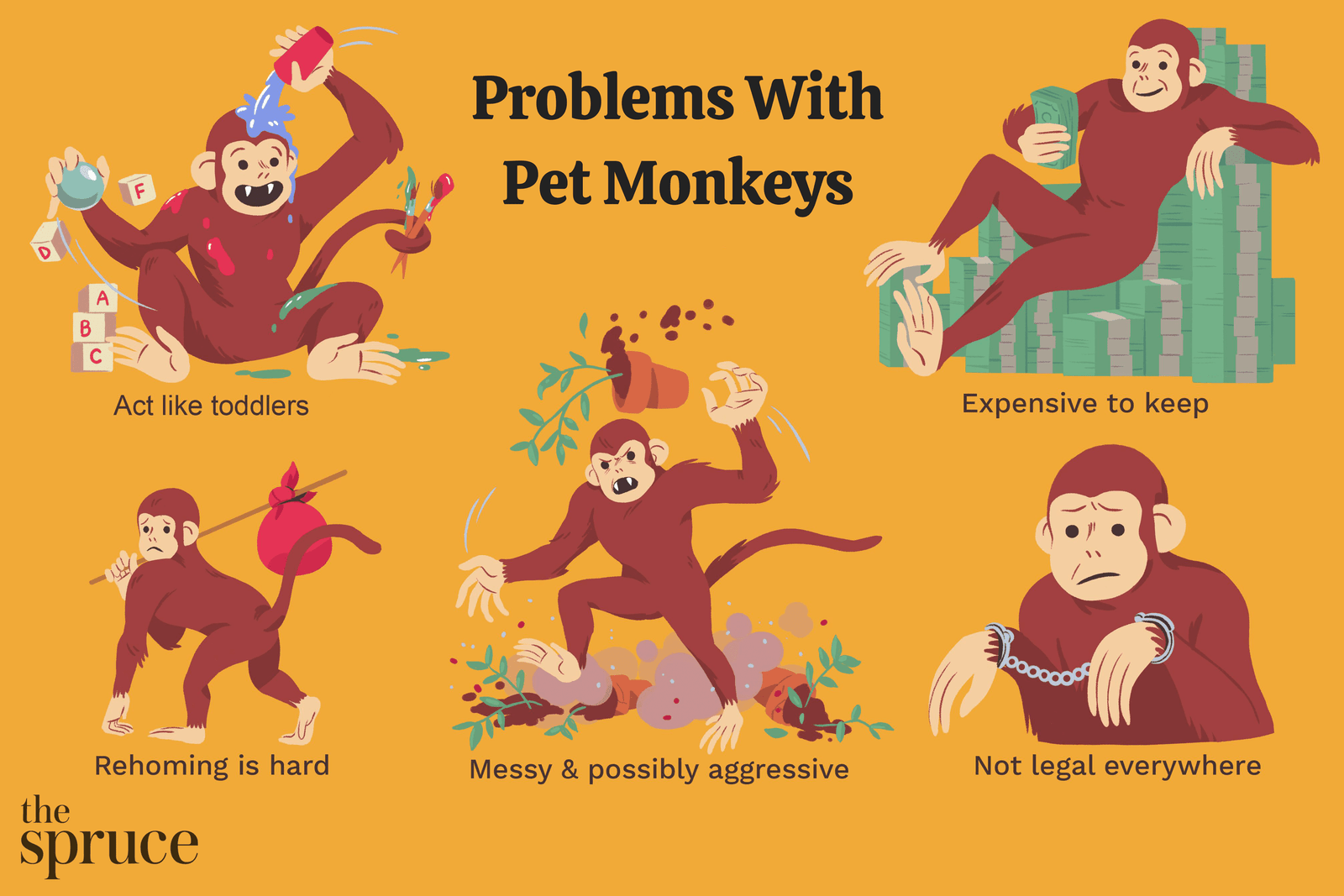Keeping a pet monkey can come with several problems, including expensive veterinary care, the risk of spreading diseases to humans, the need for companionship, and the potential danger they pose. Primates, including monkeys, are not suited for life as pets and require specialized care and attention.
Monkeys are known to cause harm and need significant care to thrive in a human household. These challenges also apply to apes like chimpanzees, orangutans, and gibbons. Monkeys and apes are social animals that need to live in groups, and
Potty training monkeys is also difficult due to their natural habits and instincts. Ultimately, it is best to reconsider the idea of owning a pet monkey.

Challenges Of Keeping A Pet Monkey
Keeping a pet monkey may seem like an exciting and unique experience, but it comes with its fair share of challenges. From health problems to social needs and potential dangers, owning a pet monkey requires specialized care and commitment. In this blog post, we will explore the challenges of keeping a pet monkey, focusing on three main aspects: health problems and specialized care, social needs and the importance of companionship, and the dangers and risks associated with pet monkeys.
Health Problems And Specialized Care
Pet monkeys, like any other primate, require specialized veterinary care to ensure their well-being. They need to be seen by veterinarians who specialize in primate health, which can be expensive and hard to find. Primates are susceptible to specific health problems, such as dental issues, diabetes, and obesity, which require regular medical attention. Additionally, primates can carry diseases that are transmissible to humans, including measles and herpes.
Social Needs And The Importance Of Companionship
Primates are highly social animals that thrive in the company of their own kind. It is crucial for their mental and emotional well-being that they have companionship from other monkeys. When primates are removed from their mothers at an early age in an attempt to “tame” them, it causes extreme suffering. It is therefore essential for pet monkey owners to provide appropriate socialization opportunities, whether through introducing another monkey or providing opportunities for interactions with their own species.
Dangers And Risks Associated With Pet Monkeys
While monkeys may appear cute and friendly, they can pose significant dangers and risks to their owners and others around them. Monkeys are curious and mischievous creatures, often displaying unpredictable behavior that can lead to harm. They have strong jaws and sharp teeth, which can cause serious injuries. Monkeys also have a natural instinct to climb and explore, which can result in property damage and potential escape attempts. Additionally, monkeys can become aggressive or territorial as they reach sexual maturity, increasing the risk of harm to both humans and other animals.
Overall, owning a pet monkey presents numerous challenges and responsibilities. From specialized veterinary care to meeting their social needs and managing the risks associated with their behavior, it is crucial to thoroughly consider all aspects before deciding to keep a pet monkey. Proper research, education, and understanding are essential before embarking on this unique and demanding journey.

Best Monkey Species For Beginners
Deciding to keep a pet monkey is a big responsibility. While they can be fascinating and entertaining companions, there are several considerations to keep in mind. It’s crucial to choose the right monkey species that matches your lifestyle and level of experience. Here are the top monkey species that are suitable for beginners:
Capuchin Monkeys
Capuchin monkeys, such as the tufted capuchin and squirrel monkeys, are often considered suitable for beginners due to their manageable size and adaptable nature. These small monkeys are known for their intelligence and learning abilities, making them relatively easier to train. They require a lot of mental stimulation and social interaction, so owners must be willing to invest time and effort into their daily care.
Marmosets
Marmosets, specifically the Pygmy marmosets, are another popular choice for beginners. These tiny monkeys are incredibly cute and have a playful nature. They are relatively easier to handle and require less space compared to larger monkey species. However, it’s important to note that marmosets have specific dietary needs, including a diet rich in insects and small fruits.
Spider Monkeys
Spider monkeys, such as the Guenon and Tamarin, can also be suitable for beginners who are prepared to provide them with the necessary care. These monkeys are known for their long limbs and incredible agility. They require ample space and enrichment to satisfy their active nature. Spider monkeys form strong social bonds, so it’s important to ensure they have companionship, either from their own species or other suitable primates.
Before bringing a pet monkey into your home, it’s crucial to research extensively and understand the specific needs and requirements of the chosen species. Consulting with experts and reputable breeders or sanctuaries can provide invaluable guidance in making a well-informed decision.
:strip_icc()/GettyImages-174409822-5c8a67ddc9e77c0001a925eb.jpg)
Frequently Asked Questions Of Problems With Keeping A Pet Monkey
What Are The Disadvantages Of Having A Pet Monkey?
Having a pet monkey has several disadvantages. Primates require specialized veterinary care, which can be expensive and hard to find. They can also spread diseases such as measles and herpes to humans. Monkeys need companionship and should be raised by their mothers to avoid suffering.
Additionally, monkeys are not suitable pets as they can cause harm and require extensive care and attention. Primates are not meant to be domesticated as they thrive in social groups and inadequate living conditions can negatively affect their health and well-being.
Is it hard to maintain a monkey?
Maintaining a monkey is challenging. Monkeys require specialized vets for health issues, can spread diseases to humans, and need companionship from their mothers. Monkeys also pose risks and need extensive care and attention to thrive in a human household. Keeping primates as pets is not recommended.
Why Don’t We Domesticate Monkeys?
Monkeys are not domesticated because they need to live in social groups and be raised by their mothers. Keeping them as pets can cause harm and suffering. They also require specialized veterinary care and can spread diseases to humans. Additionally, monkeys have different waste elimination instincts and cannot be potty trained like other pets.
Overall, monkeys are not suitable or safe pets.
Why can’t you potty train a monkey?
Monkeys cannot be potty trained because their natural instincts and behaviors related to waste elimination do not align with the concept of potty training. They are tree dwellers and do not have a natural inclination to care about what goes on the floor or ground.
Monkeys also have different needs and behaviors that make them unsuitable for domestication as pets.
Conclusion
Keeping a pet monkey may seem like an exciting prospect, but there are numerous problems that come with it. Health issues, the need for specialist vets, and the potential spread of diseases to humans are just a few of the disadvantages.
Additionally, primates need companionship and suffer greatly when removed from their mothers too early. The reality is that monkeys require a level of care and attention that is difficult to provide in a human household. Overall, it’s best to consider the welfare of these animals and refrain from keeping them as pets.

